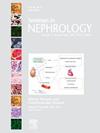Gene-Disease Relationships in Kidney Genetics
IF 3.5
3区 医学
Q2 UROLOGY & NEPHROLOGY
引用次数: 0
Abstract
Genomic sequencing technologies are used in diagnostic laboratories to identify genetic causes of disease in patients. Gene curation plays an integral role by determining which genes have sufficient evidence for inclusion in diagnostic panels and those that should be prioritized in genome and exome sequencing. As the precursor to variant curation, gene curation also establishes pathogenicity limits for variant classification. Evaluating the clinical validity of a gene–disease relationship requires assessment of genetic and experimental evidence from literature and databases. The Clinical Genome Resource (ClinGen) has a semiquantitative framework for gene curation that is used across its Gene Curation Expert Panels (GCEPs). The ClinGen Kidney Disease Clinical Domain Working Group oversees five GCEPs covering the glomerulopathies, tubulopathies, complement-mediated kidney diseases, congenital anomalies of the kidney and urinary tract, and renal ciliopathies. These panels use a multidisciplinary approach in their gene curations, which are published and accessible to the public via the ClinGen website. ClinGen’s expert-informed curations and other resources outlined in this review will help nephrologists validate whether genetic findings in reports are clinically relevant to their patients. Empowering nephrologists with knowledge of gene curation principles is imperative for informed decision-making in patient care.
肾脏遗传学中的基因-疾病关系。
基因组测序技术被用于诊断实验室,以确定患者疾病的遗传原因。基因管理通过确定哪些基因有足够的证据可以纳入诊断小组,哪些基因应该在基因组和外显子组测序中优先考虑,发挥着不可或缺的作用。作为变异管理的先驱,基因管理还建立了变异分类的致病性限制。评估基因-疾病关系的临床有效性需要评估来自文献和数据库的遗传和实验证据。临床基因组资源(ClinGen)有一个基因管理的半定量框架,用于其基因管理专家小组(gcep)。ClinGen肾脏疾病临床领域工作组负责监督五个GCEPs,涵盖肾小球疾病、小管疾病、补体介导的肾脏疾病、肾脏和尿路先天性异常以及肾纤毛病。这些小组在他们的基因管理中使用多学科方法,这些方法通过ClinGen网站发布并向公众开放。ClinGen的专家指导和本综述中概述的其他资源将帮助肾病学家验证报告中的遗传发现是否与患者临床相关。赋予肾病学家基因治疗原则的知识是必要的知情决策在病人护理。Semin Nephrol 36:x-xx©20XX Elsevier Inc.。版权所有。
本文章由计算机程序翻译,如有差异,请以英文原文为准。
求助全文
约1分钟内获得全文
求助全文
来源期刊

Seminars in nephrology
医学-泌尿学与肾脏学
CiteScore
5.60
自引率
0.00%
发文量
27
审稿时长
6-12 weeks
期刊介绍:
Seminars in Nephrology is a timely source for the publication of new concepts and research findings relevant to the clinical practice of nephrology. Each issue is an organized compendium of practical information that serves as a lasting reference for nephrologists, internists and physicians in training.
 求助内容:
求助内容: 应助结果提醒方式:
应助结果提醒方式:


